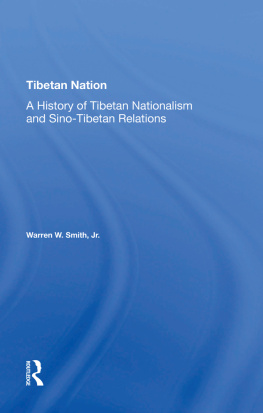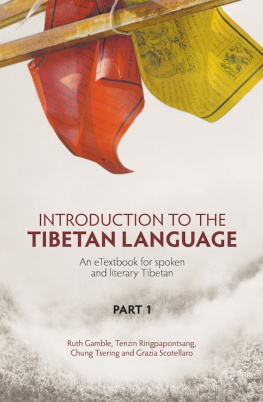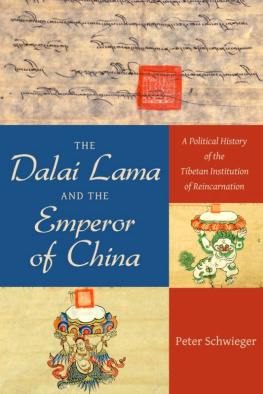First published 1996 by Westview Press
Published 2019 by Routledge
52 Vanderbilt Avenue, New York, NY 10017
2 Park Square, Milton Park, Abingdon, Oxon OX14 4RN
Routledge is an imprint of the Taylor & Francis Group, an informa business
Copyright 1996 by Taylor & Francis
All rights reserved. No part of this book may be reprinted or reproduced or utilised in any form or by any electronic, mechanical, or other means, now known or hereafter invented, including photocopying and recording, or in any information storage or retrieval system, without permission in writing from the publishers.
Notice:
Product or corporate names may be trademarks or registered trademarks, and are used only for identification and explanation without intent to infringe.
Library of Congress Cataloging-in-Publication Data
Smith, Warren W.
Tibetan nation: a history of Tibetan nationalism and Sino-Tibetan
relations / by Warren W. Smith, Jr.
p. cm.
Includes bibliographical references and index.
ISBN 0-8133-3155-2
1. NationalismChinaTibet. 2. Tibet (China)Politics and
government. 3. Tibet (China)RelationsChina. 4. China
RelationsChinaTibet. I. Title.
DS786.S56 1996
951'.5dc20 96-34206
CIP
ISBN 13: 978-0-367-27401-6 (hbk)
If history were a chronicle of the voluntary association and disassociation of groups, there would be no need for a doctrine of self-determination. It is the distinct absence of such a peaceful evolution of mankind's social organization which ultimately gave rise to the principle of self-determination as the twentieth century's primary expression of disapproval of involuntary political association.
Lee C. Buchheit, Secession: The Legitimacy of Self-Determination
Where the sentiment of nationality exists in any force, there is a prima facie case for uniting all the members of the nationality under the same government, and a government to themselves apart. This is merely saying that the question of government ought to be decided by the governed. One hardly knows what any division of the human race should be free to do if not to determine with which of the various collective bodies of human beings they choose to associate themselves.
John Stuart Mill, Utilitarianism, Liberty and Representative Government
To us Tibetans the phrase "the liberation of Tibet," in its moral and spiritual implications, is based upon a deadly mockery. The country of a free people was invaded and occupied under the pretext of liberation liberation from whom and what? Ours was a happy country with a solvent Government and a contented people till the Chinese invasion in 1950.
"Manifesto by Tibetan Leaders," in The Question of Tibet and the Rule of Law
Tibet is far away, and other countries have their own fears and troubles. We can well understand that there may be a tendency to let the events in Tibet drift back into history. Yet Tibet is on this very earth; Tibetans are human; in their way they are very civilized; certainly they are sensitive to suffering. I would dare to say that no people have suffered more since the Second World War; and their sufferings have not ended, they are continuing every day, and they will continue until the Chinese leave our country, or until Tibetans have ceased to exist as a race or as a religious community.
Dalai Lama, My Land and My People
Tibet's brief appearance on the international political stage in 1950-1951, at the time of the Chinese invasion, and in 1959, following the flight of the Dalai Lama into exile in India, was followed by long periods of the absence of any news on Tibet, except the glowing reports emanating from the PRC propaganda machine about the glorious progress of the Tibetan people in achieving "liberation," "democratic reforms," and "socialist transformation." Since 1980, however, the opening of Tibet to the outside world has revealed that Chinese rule in Tibet has been oppressive and destructive of Tibetan culture and civilization. In addition, Tibetan nationalism has not been eradicated but has been exacerbated by Chinese rule and repression. In a phenomenon typical of colonialism, Tibetan nationalism has grown under the conditions of foreign conquest and rule despite every effort by the Chinese to eradicate it.
The history of Tibetan nationalism and Sino-Tibetan relations involves immensely complicated historical and political issues. Tibetans and Chinese will never agree on whether Tibet was or even currently is a "part of China." In the Tibetan Empire period of the seventh to ninth centuries, a centralized Tibetan government dominated the entire Tibetan plateau and consolidated a Tibetan cultural and political identity over that area. In later centuries, however, with the demise of a centralized government and the rise of the Tibetan Buddhist state, which was dependent upon foreign political and military patronage, Tibet came under the foreign domination of Mongol and Manchu empires, both of which were also ruling dynasties of China. China, when it overcame its own foreign domination, was thus able to claim Tibet as part of China due to the legacy of Mongol and Manchu domination over Tibet. Tibetan nationalism, little developed under the politically benign conditions of indirect rule, was aroused by China's attempt to transform its previous "suzerainty" into direct sovereignty.
After the Chinese Communists' "liberation" of Tibet in 1950-1951, Tibetan "local nationalism" was targeted for eradication by Marxist-Leninist nationalities policies, which were purported to provide the "solution to the nationalities question." Marx and Lenin had realized that nationalism is inevitably aroused by foreign imperialism; however, because Marxists define themselves as anti-imperialists, they have not applied this lesson to nations under their own domination. Instead, Marxists have attempted to disguise their imperialist domination of other nations by claiming to have "liberated" those nations from their own ostensibly "feudal" and exploitative social and political systems, a type of justification typical of imperialism. The issue of Tibet is not the nature of its former social and political system, a system far more benign than the "hell on earth" described in Chinese propaganda. Instead, the issue is the legitimacy of China's invasion and conquest of Tibet, its continuing foreign imperialist rule over Tibet and its denial of Tibetans' right to self-determination.
The history of Tibetan nationalism and Sino-Tibetan relations may be divided into four main periods. The first period is that of the consolidation of the Tibetan state from the beginnings of Tibetan history up to the fall of the Tibetan empire in 842. The territory and peoples of the Tibetan plateau were politically unified by the Tibetan empire (630-842), the only time in history that all of Tibet was unified under an independent centralized Tibetan state. During the empire period, Tibet rivaled T'ang dynasty China (618-907) for influence in Inner Asia and along the frontier between the two countries. It is during this period that Tibetan cultural, territorial and political identities, the fundamentals of later Tibetan nationalism, were consolidated.
After the collapse of the Tibetan empire in 842, Tibet was not again politically unified until the mid-13th century, when Tibetan lamas established a political-spiritual relationship, known as Cho-Yon, or priest patron relationship, with the Mongol empire. This arrangement averted a Mongol conquest of Tibet and established ecclesiastical rule in Tibet under the Sakya sect. Tibet was a dependent state under the Mongol Yuan (1260-1368) and Manchu Ch'ing (1644-1911) dynasties. Tibet was independent of Chinese influence during the native Chinese Ming dynasty (1368-1644). Tibet's relationship to China during the Yuan and Ch'ing may be characterized as indirect rule typical of feudal relationships. Tibetan feudal relations with the Mongol Yuan and the Manchu Ch'ing had little impact upon Tibetan ethnic, cultural or national identity.










